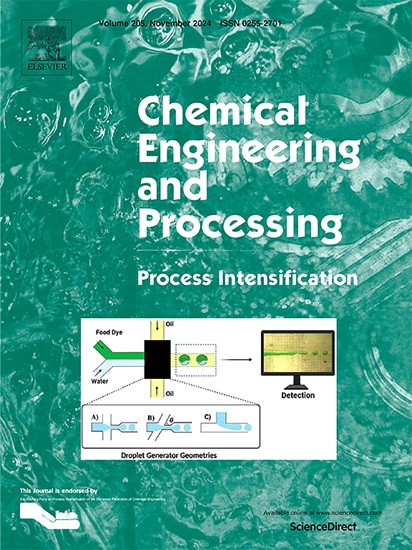Numerical simulation on electrical-intensified separator: The development of the flow field and its separation performance
IF 3.8
3区 工程技术
Q3 ENERGY & FUELS
Chemical Engineering and Processing - Process Intensification
Pub Date : 2025-04-01
DOI:10.1016/j.cep.2025.110281
引用次数: 0
Abstract
Wastewater treatment for improving energy efficiency to promote water resource recycling is required globally. Centrifugation technology has been widely applied in industrial wastewater pretreatment. However, conventional hydrocyclones induce high breakage rate of droplets owing to the high shear force. Therefore, the electrical-intensified separator was designed. It provides preseparation and strengthened environments and applies electrical field to intensify separation effect. A simulation of the separator was conducted. The separation performance was investigated, and the reason for low energy loss was discussed. Simultaneously, the simulation was verified through experiment. The results show that the electrical-intensified separator not only increases efficiency by 20 % but also decreases dynamic energy loss by >120 Pa under V = 5 m/s compared to the conventional hydrocyclone. And numerical results agree with experiment. The separator decreases the rate of droplet breakup and enhances separation due to the separation with progressive process, making the region distribution of tangential velocity wider and greater. Additionally, the role of electrical field intensifies the droplet migration, which is conducive to increase the movement of mixture in flow field. Therefore, the dynamic pressure loss of this separator is significantly lower than conventional hydrocyclone.

电强化分离机的数值模拟:流场的发展及其分离性能
全球都需要通过废水处理来提高能源效率,促进水资源循环利用。离心技术在工业废水预处理中得到了广泛的应用。常规水力旋流器由于剪切力大,液滴破碎率高。为此,设计了电强化分离机。它提供了预分离和强化环境,并施加电场来强化分离效果。对该分离器进行了仿真。对其分离性能进行了研究,并对低能量损失的原因进行了探讨。同时,通过实验对仿真结果进行了验证。结果表明:与常规水力旋流器相比,在V = 5 m/s时,电强化分离器的效率提高了20%,动态能量损失降低了120 Pa。数值结果与实验结果吻合较好。分离器降低了液滴的破碎速率,由于分离过程呈递进式,从而提高了分离效果,使得切向速度的区域分布更宽、更大。此外,电场的作用加剧了液滴的迁移,有利于增加混合物在流场中的运动。因此,该分离器的动压损失明显低于常规水力旋流器。
本文章由计算机程序翻译,如有差异,请以英文原文为准。
求助全文
约1分钟内获得全文
求助全文
来源期刊
CiteScore
7.80
自引率
9.30%
发文量
408
审稿时长
49 days
期刊介绍:
Chemical Engineering and Processing: Process Intensification is intended for practicing researchers in industry and academia, working in the field of Process Engineering and related to the subject of Process Intensification.Articles published in the Journal demonstrate how novel discoveries, developments and theories in the field of Process Engineering and in particular Process Intensification may be used for analysis and design of innovative equipment and processing methods with substantially improved sustainability, efficiency and environmental performance.

 求助内容:
求助内容: 应助结果提醒方式:
应助结果提醒方式:


